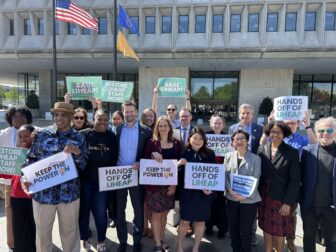As key August deadline looms, Western MD landowners and environmental leaders call passage of statutory protections imperative this year
Rally-goers display map of gas basins at risk of being fracked across MD, including just south of Annapolis, to underscore the statewide threat
ANNAPOLIS—More than 100 grassroots supporters of fracking moratorium legislation rallied across from the State House in Annapolis on Wednesday to declare 2014 a make-or-break year for General Assembly passage of statutory drilling protections. Western Maryland and statewide environmental leaders warned that, with Governor O’Malley’s three-year executive order halting drilling permits set to expire in August, the decision as to whether or not to frack in Maryland could be made shortly thereafter—regardless of the results of as-yet-incomplete risk studies or the will of the General Assembly.
Rally-goers underscored these stakes by asking arriving lawmakers if they were prepared to sign a “waiver” ceding their “right to protect my constituents from the dangerous impacts of fracking.” Activists, who travelled to Annapolis from as far afield as western Maryland, Frederick, Baltimore, the DC suburbs, and southern Maryland, also displayed a large map of the five gas basins stretching statewide that are at risk of being fracked. Over the border in Virginia, a Texas-based gas company has already declared its intent to begin fracking in the Taylorsville basin—which extends underneath Charles, Prince George’s, Calvert, St. Mary’s and Anne Arundel counties—within the next 18 months.
“A statutory moratorium is, plain and simple, the responsible way for the General Assembly to move forward in 2014,” said State Senator Ron Young (D-Frederick), who will introduce the 2014 legislation in the Senate. “Communities statewide, from western Maryland to Frederick to Anne Arundel county, face the real threat of drilling harming their drinking water, health and local economies. My legislation will ensure that, once comprehensive risk studies are completed, the Maryland public and their elected representatives alike are given due time to review the results and decide whether or not the risks are acceptable.”
The 2014 bill, to be introduced by Sen. Young and Delegate Heather Mizeur (D-Montgomery), would prevent state agencies from issuing fracking permits until several common-sense criteria are met, including the completion of a thorough risk assessment and an 18-month review period to allow the public and General Assembly to respond to the results.
“Right now, drilling can move forward the moment the Governor’s advisory commission issues the final study report,” said Delegate Heather Mizeur (D-Montgomery). “We need to pass this bill in 2014 to ensure that gold standard safeguards are in place for Maryland’s residents, wildlife, waterways, and environment, before one drill enters the ground. This session is our last chance to get this right.”
In the 2013 General Assembly, fracking moratorium legislation came one vote shy of passing the Senate Committee on Education, Health and Environmental Affairs. Since then, significant new evidence has emerged showing that fracking impacts nationwide—from groundwater contamination to air and climate pollution—are worse than previously thought. In Maryland, due in part to budgetary and resource constraints, state agencies are far behind schedule and rushing to complete the series of state-specific water, health, economic and regulatory studies laid out in Governor O’Malley’s soon-to-expire executive order.
“As the clock ticks down to August 2014, state agencies are pulling an ‘incomplete’ in far too many categories,” said Eric Robison, a Garrett County landowner who is co-founder and president of Citizen Shale. “Western Marylanders are counting on the General Assembly to step in this year and ensure that no hasty decisions are made. Given the stakes for our health, safety and tourism economy, we deserve no less.”
“For three years and counting, Marylanders have been emailing, calling, lobbying and rallying for basic statutory protections against fracking’s many dangers,” said Mike Tidwell, director of the Chesapeake Climate Action Network. “Our message to the General Assembly in 2014 is simple: This is the year you must act.”
Click here for a fracking moratorium 2014 legislative update (pdf).
Contact:
Eric Robison, Citizen Shale, (301) 616-0085, info@citizenshale.org
Kelly Trout, Chesapeake Climate Action Network, 240-396-2022, kelly@chesapeakeclimate.org
###




